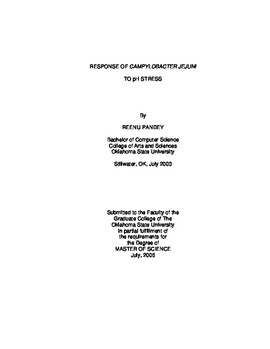| dc.contributor.advisor | Stintzi, Alain | |
| dc.contributor.author | Padney, Reenu | |
| dc.date.accessioned | 2014-04-16T03:16:01Z | |
| dc.date.available | 2014-04-16T03:16:01Z | |
| dc.date.issued | 2005-07-01 | |
| dc.identifier.uri | https://hdl.handle.net/11244/9826 | |
| dc.description.abstract | Enteric pathogens, in order to transit through the gut and cause disease, must survive the acid pH of the stomach. Pathogenic species that prefer to grow at neutral pH, display a wide range of mechanisms to survive extreme pH. Campylobacter jejuni is the leading cause of bacterial food-borne diarrhea throughout the developed world. In this study, we used DNA microarrays to measure the global change in transcript levels over time due to pH stress. The transcript level of 325 genes was affected over a 20 min time period. Genes encoding heat shock proteins, chaperonins and oxidative stress defence were up-regulated. This gene profile suggests that C. jejuni quickly readjusts its transcript levels to a new steady state, thus allowing the bacterium to survive the stress. These findings provide new insights towards the C.jejuni mechanisms for acid stress and how to survive and adapt its transcriptome to a new growth condition. | |
| dc.format | application/pdf | |
| dc.language | en_US | |
| dc.publisher | Oklahoma State University | |
| dc.rights | Copyright is held by the author who has granted the Oklahoma State University Library the non-exclusive right to share this material in its institutional repository. Contact Digital Library Services at lib-dls@okstate.edu or 405-744-9161 for the permission policy on the use, reproduction or distribution of this material. | |
| dc.title | pH Stress Response in C.jejuni | |
| dc.type | text | |
| dc.contributor.committeeMember | Clarke, Cyril | |
| dc.contributor.committeeMember | Barrow, William | |
| osu.filename | Pandey_okstate_0664M_1474.pdf | |
| osu.college | Center for Veterinary Health Sciences | |
| osu.accesstype | Open Access | |
| dc.description.department | Veterinary Pathobiology | |
| dc.type.genre | Thesis | |
